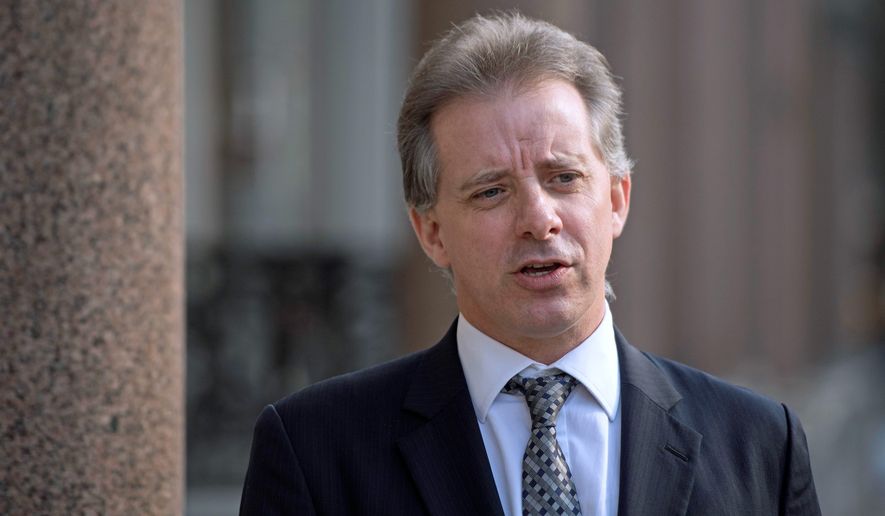OPINION:
Earlier this month, President Trump publicly called for the extradition of former British MI6 Intelligence Officer Christopher Steele, author of the infamous and now thoroughly debunked opposition research “dossier” on then-candidate Trump in 2016.
The president was reacting to a British court ruling that Mr. Steele had violated a data privacy law by failing to vet the information he included in his report for the Hillary Clinton campaign on the Trump campaign’s supposed Russia connections.
Mr. Steele, a former MI6 agent now running a private intelligence firm, was ordered to pay damages to Alfa Bank owners Mikhail Fridman and Peter Aven over “inaccurate or misleading” material in the dossier, including false claims the bank owners funneled “illicit cash” to Russian President Vladimir Putin during the early 1990s, when Mr. Putin was deputy mayor of St. Petersburg.
Presiding Judge Mark Warby admonished Mr. Steele that “this allegation clearly called for closer attention, a more enquiring approach and more energetic checking.”
Mr. Steele’s dossier made a number of other sensational but inaccurate claims, including that Mr. Fridman and Mr. Aven provided Mr. Putin with foreign policy guidance; that former Trump lawyer Michael Cohen traveled to Prague to conspire with Russian hackers; and that Russian intelligence possessed a salacious blackmail tape of Mr. Trump himself.
It gets worse.
Last week, Senate Judiciary Committee Chairman Lindsey Graham released declassified FBI documents — including the FBI’s interview of Mr. Steele’s primary source — which cast further doubts on the veracity of the dossier. Mr. Steele’s informant admitted to the FBI that he had been in contact with Russia’s FSB. According to the Department of Justice inspector general’s report, the FBI learned in 2017 that Russian intelligence was using Mr. Steele as an unwitting conduit for disinformation.
Having reportedly served as an intelligence officer in Moscow in the early 1990s and as chief of the Russia desk at MI6 headquarters before retiring in 2009, Mr. Steele should have known better. A counterintelligence specialist, Mr. Steele was the case officer for Russian FSB officer Alexander Litvinenko, a defector whom the Kremlin had poisoned in London with Polonium-210.
Despite his service in MI6, Mr. Steele seemed inexplicably clueless to the ways of Russia’s powerful intelligence services — and to the sophisticated tradecraft required to collect intelligence in their midst.
Mr. Steele testified in a London court in March that he had not lived in Russia for 27 years. He confirmed that he acquired all of the sources he used in his dossier after he retired from government service and that he had not visited Russia in over a decade.
According to the FBI documents made public by Mr. Graham, Mr. Steele used email, Skype and phones in dealing with his sources, all woefully insecure communications channels which the FSB would have easily penetrated.
The dossier was not Mr. Steele’s first significant post-MI6 error in judgment. He also worked for a time for Russian oligarch and Putin confidante Oleg Deripaska. In 2018, the U.S. imposed sanctions on Mr. Deripaska over his suspected links to organized crime.
By producing the fodder which would pit Democrats against Republicans, Mr. Steele unwittingly was doing the bidding of Mr. Putin, a former KGB agent himself. Mr. Steele’s dossier magnified Mr. Putin’s influence operations, designed to soil our democratic processes. Mr. Steele’s conduct was extraordinarily egregious, but the FBI also should have known better than ever to rely on his dossier in its Crossfire Hurricane Investigation.
Mr. Steele reportedly revealed the identities of the sources used in the dossier to the FBI. He had been a paid confidential source for the FBI before preparing the dossier, and the FBI judged Mr. Steele’s information to be valuable enough that it warranted more compensation. Mr. Steele reportedly received payments from the FBI between 2014 and 2016.
And then there are the U.S. politicians and senior officials who allowed their own deep biases to cloud their assessment of Mr. Steele’s “findings.”
I’m a retired intelligence officer and not a lawyer, so I’ll leave it to the legal professionals to comment on President Trump’s extradition demand to force Mr. Steele to face American justice.
But I will invoke a former CIA mentor who, after I had not performed as well as I should have during a clandestine operation early in my career, observed that we are all human and make mistakes. The mentor quickly added that only those who admit their mistakes, learn from them and correct course are worthy of being trusted going forward.
Mr. Steele would best serve his own interests — and the national security of both the U.K. and U.S. — with a mea culpa admitting his errors of judgment and laying out the multitude of lessons we should learn from his shoddy work product.
With the 2020 presidential election in Mr. Putin’s crosshairs, there is precious little time left for Mr. Steele to ease his guilty conscious, repair his tattered reputation, and help us better prepare to counter Russia’s pernicious and multifarious plans.
• Daniel N. Hoffman is a retired clandestine services officer and former chief of station with the Central Intelligence Agency. His combined 30 years of government service included high-level overseas and domestic positions at the CIA. He has been a Fox News contributor since May 2018. Follow him on Twitter @DanielHoffmanDC.




Please read our comment policy before commenting.